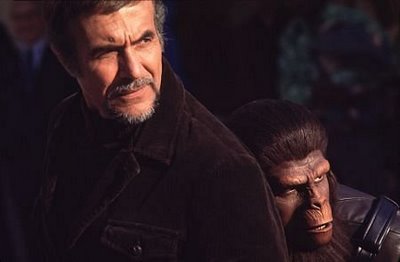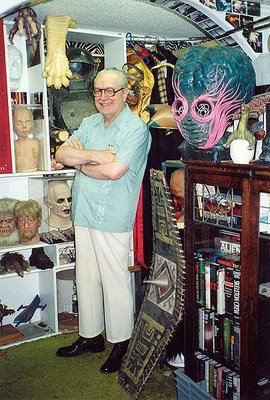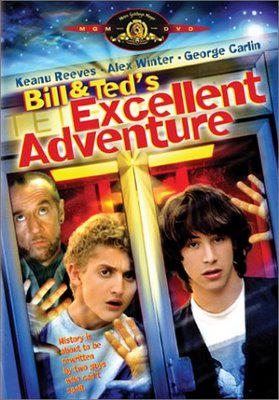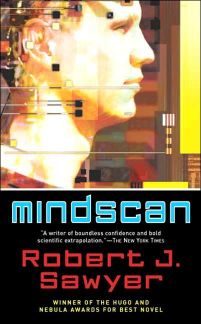R.I.P, Paul Quarrington
Great writer, great person. A real loss.
Visit The Robert J. Sawyer Web Site
and WakeWatchWonder.com
Labels: Deaths
Library Journal on Wake: "Sawyer's erudition, eclecticism, and masterly storytelling make this a choice selection."
Great writer, great person. A real loss.
Visit The Robert J. Sawyer Web Site
and WakeWatchWonder.com
Labels: Deaths
Henry Gibson died this week as well; people today probably knew him best for his recurring role as a virginal judge on Boston Legal, but to people my age or older, he was best known for his poetry on Rowan & Martin's Laugh-In, which I watched often with my parents in the 1960s.
Visit The Robert J. Sawyer Web Site
and WakeWatchWonder.com
Labels: Deaths
Visit The Robert J. Sawyer Web Site
and WakeWatchWonder.com
Labels: Deaths

"I always look forward to Robert J. Sawyer's books. One reason is that Sawyer is just about the best science fiction writer out there these days: compelling stories, believable scenarios, science and fiction that really interact. But the main reason is that after reading and reviewing several Sawyer novels, I know that each book he writes will be unique.The paper went on to name Calculating God the best SF novel of the year -- giving it the paper's Rocky Award -- and included it on their list of the year's best books of any type.
I think it is safe to say that no book of popular science fiction exists that is remotely similar to Calculating God. In an effort to convince Tom Jericho of God's existence, Hollus uses scientific laws and the mathematics of probability. His arguments are the most convincing I have seen since Thomas Aquinas — maybe more so.
I have always thought that a good novel keeps readers turning the pages to find out the fate of characters they care about. But for fiction to be called literature, the story should stay with readers and keep them thinking about it long after the book has been put away. It is safe to say that Sawyer has accomplished both with Calculating God
"Here are a few of the things I like about Robert J. Sawyer: His novels are fast moving and tightly constructed; his characters are developed so that I care what happens to them; the science in his science fiction is intrinsic to the plot but not so arcane that readers have to be nuclear physicists to understand it; and he doesn't imitate others or himself."Robert Charles Wilson and I had a wonderful lunch with Mark Graham at last year's Worldcon in Denver (Mark's a big fan of Bob's books, too), and when I was in Denver on book tour for Rollback, Mark gave the introductory comments about me at my event at The Tattered Cover.
The Robert J. Sawyer Web Site
Labels: Deaths, Publishing
Eric McMillan, the Chair of Skeptics Canada, reports:
With great sorrow, we report that Henry Gordon has passed away.I was quite an admirer of Henry, and even named an institute after him in my first novel, 1990's Golden Fleece. In a scene written March 14, 1989, I wrote [from the point of view of a scheming artificial intelligence]:
Henry was a professional magician, journalist, book author, and leading Canadian skeptic. He was a founder and chair of the Ontario Skeptics, a precursor to Skeptics Canada, for which he remained chair emeritus and a respected member. He was also a fellow of the Committee for the Scientific Investigation of Claims of the Paranormal (CSICOP), now CSI. He was well-known internationally for his exposures of Uri Geller, Shirley Maclaine and other paranormal practitioners in his books, articles and television appearances.
I made a mini-backup of myself so that I could undertake the interactive dialogue necessary for testing. I let the backup play inquisitor, while I, on the lowest and most simplistic level, tried to access the Aaron Rossman memories I had recorded. It was a tricky process, involving as much learning about Aaron's particular style of recording information as it did fine-tuning my ability to access specific facts.Given who Henry was, it would be wrong to say he's passed on or to wish that he might rest in peace. Henry is gone, pure and simple -- and the world is poorer for it.
The discovery by Barnhard and his group at the Henry Gordon Institute in 2011 that each human seemed to use a unique encoding algorithm put an end to the claims of psychics, mind readers, and other charlatans. Oh, it could be demonstrated that humans did indeed give off electromagnetic signals that corresponded to their thoughts. And, indeed, if one had sufficiently acute sensing devices and the ability to screen the weak signal from the background EM noise, then, yes, one could detect that energy. But the fact that every individual used a different encoding algorithm and key, and, indeed, that many individuals used multiple algorithms depending on the kinds of thoughts they were thinking -- the alpha and beta waves of the EEG being the crudest indication of that -- meant that even if you could pick up the thought signals, which seemed impossible without direct physical contact with the person's head, you couldn't decipher the thoughts without massive number crunching.
Number crunching, of course, is something I have a knack for.
The Robert J. Sawyer Web Site
Labels: Deaths, Golden Fleece

Police officer: "Circuses are past history."Rest in peace, Señor Montalbán.
Armando: "Not while I live and breathe."
The Robert J. Sawyer Web Site
Labels: Deaths

The Robert J. Sawyer Web Site
Labels: Deaths

The Robert J. Sawyer Web Site
Labels: Deaths

The Robert J. Sawyer Web Site
Labels: Deaths
Baby, if you've ever wondered,
The Robert J. Sawyer Web Site
Labels: Deaths
In the introduction to my short story "Star Light, Star Bright," which appears in my first collection, Iterations, I wrote:
In 1997, I happened to run into WKRP in Cincinnati star Gordon Jump at a deli in Los Angeles; I introduced myself by saying I wanted to shake the hand of the man who had uttered the funniest line in sitcom history -- a line that was echoing gently in my mind as I wrote this story.Sometimes, people send me emails asking just what the heck was the line I was referring to. It was, of course, "As God is my witness, I thought turkeys could fly," and it comes from the WKRP episode "Turkeys Away."
The Robert J. Sawyer Web Site
Labels: Deaths

The Robert J. Sawyer Web Site
Labels: Deaths

The Robert J. Sawyer Web Site
Labels: Deaths

Toronto -- American by birth but Canadian by choice, publisher Robert Fitzhenry died at home in his sleep on Thursday, Jan. 3. He was 89.As another science-fictional connection, it should be noted that Fitzhenry & Whiteside used to be the Canadian distributor of Ace Books.
A wordsmith and an entrepreneur, he moved across the border in 1966 and co-founded Fitzhenry & Whiteside, a significant distribution company that represented Harper & Row (now part of HarperCollins) and other American houses, especially in the 1970s and 1980s. Mr. Fitzhenry published a number of Canadian reference books, including the Funk & Wagnalls Canadian College Dictionary and the Fitzhenry & Whiteside Thesaurus, Book of Quotations, Book of Canadian Facts and Dates and Trees in Canada.
He had been in ill health since suffering the first of two serious strokes in 1995. Predeceased by wife Hilda and daughter Bridget, he is survived by daughters Sharon and Hollister Doll (Holly) and three grandchildren. There will be a private family funeral followed by a public memorial service at a later date.

The Robert J. Sawyer Web Site
Labels: Deaths

The Robert J. Sawyer Web Site
Labels: Deaths

I went to see Dr. Porter about the problem with thoughts I intended to keep private being spoken aloud.That was based in large part on the pioneering research of Benjamin Libet. Sadly, Dr. Libet passed away last week, at the age of 91. I'm sorry to see him go. Wikipedia has a good article about him. R.I.P., Dr. Libet.
"Ah, yes," he said, nodding. "I've seen that before. I can make some adjustments, but it's a tricky mind-body interface problem."
"You've got to fix it. Unless I explicitly decide to do something, it shouldn't happen."
"Ah," said Porter, his eyebrows working with glee, "but that's not how humans work -- not even biological ones. None of us consciously initiate our actions."
I shook my head. "I've studied philosophy, doc. I'm not prepared to give up on the notion of free will. I refuse to believe that we live in a deterministic universe."
"Oh, indeed," said Porter. "That's not what I meant. Say you walk into a room, see someone you know, and decide to extend your hand in greeting. Of course, your hand doesn't instantly shoot out; first, stuff has to happen in your brain, right? And that stuff -- the electrical change in the brain that precedes voluntary action -- is called the readiness potential. Well, in a biological brain the readiness potential begins 550 milliseconds -- just over half a second -- prior to your hand beginning to move. It really doesn't matter what the voluntary act is: the readiness potential occurs in the brain 550 milliseconds before the motor act begins. Okay?"
"Okay," I said.
"Ah, but it's not okay! See, if you ask people to indicate exactly when they decided to do something, they report that the idea occurred to them about 350 milliseconds before the motor act begins. A guy named Benjamin Libet proved that ages ago."
"But -- but that must be a measurement error," I said. "I mean, you're talking about milliseconds."
"No, not really. The difference between 550 milliseconds and 350 milliseconds is a fifth of a second: that's quite a significant amount of time, and easy enough to measure accurately. This basic test has been replicated over and over again since the 1980s, and the data are rock solid."
"But that doesn't make sense. You're saying --"
"I'm saying that what our intuition tells us the sequence of events should be, and what the sequence actually is, don't agree. Intuitively, we think the sequence must be: first, you decide to shake hands with your old friend Bob; second, your brain, in response to that decision, begins sending signals to your arm that it wants to shake hands; and third, your arm starts to swing up for the handshake. Right? But what really happens is this: first, your brain starts sending signals to shake hands; second, you consciously decide to shake hands with your old friend; and third, your arm starts to swing up. The brain has started down the road to shaking hands before you have consciously made any decision. Your conscious brain takes ownership of the action, and fools itself into thinking it started the action, but really it's just a spectator, watching what your body is doing."
"So you are saying there's no free will."
"Not quite. Our conscious minds have the free will to veto the action. See? The action begins 550 milliseconds prior to the first physical movement. Two hundred milliseconds later, the action that's already been started comes to the attention of your conscious self -- and your conscious self has 350 milliseconds to put on the brakes before anything happens. The conscious brain doesn't initiate so-called voluntary acts, although it can step in and stop them."
"Really?" I said.
Porter nodded his long face vigorously. "Absolutely. Everybody's experienced this, if you stop and think about it: you're lying in bed, quite mellow, and you look over at the clock, and you think to yourself, I really should get up, it's time to get up, I've got to go to work. You may think this a half-dozen times or more, and then, suddenly, you are getting up -- the action has begun, without you being consciously aware that you've finally, really made the decision to get out of bed. And that's because you haven't consciously made that decision; your unconscious has made it for you. It -- not the conscious you -- has concluded once and for all that it really is time to get out of bed."
"But I didn't have this problem when I was biological."
"No, that's right. And that was because of the slow speed of chemical reactions. But your new body and your new brain operate at electrical, not chemical, speeds, and the veto mechanism sometimes comes into play too late to do what it's supposed to do. But, as I said, I can make a few adjustments. Forgive me, but I'm going to have to pull back the skin on your head, and open up your skull ..."

The Robert J. Sawyer Web Site
Air Canada managed to get me on a later flight, after my earlier flight from Vancouver was canceled because of an impending snow storm in Toronto, and so I'm now home safe and sound in freezing Mississauga (quite a contrast to the balmy weather in Victoria).
The Robert J. Sawyer Web Site
Labels: Deaths

The Robert J. Sawyer Web Site
Labels: Deaths

To whom it may concern:
I've been fortunate enough to have Howard Miller proofread diskette copies of the manuscripts of my last several novels prior to their typesetting. Even though the manuscripts had already been read innumerable times by myself, my wife, and several writing colleagues, Howard nonetheless found errors that had slipped by everyone else (not to mention having eluded my word-processing program's spelling checker).
These days, I wouldn't want my editors to see a manuscript that hadn't first been checked by Howard. He is fast, efficient, accurate, and pleasant to deal with. I wholeheartedly recommend his services.
Labels: Deaths